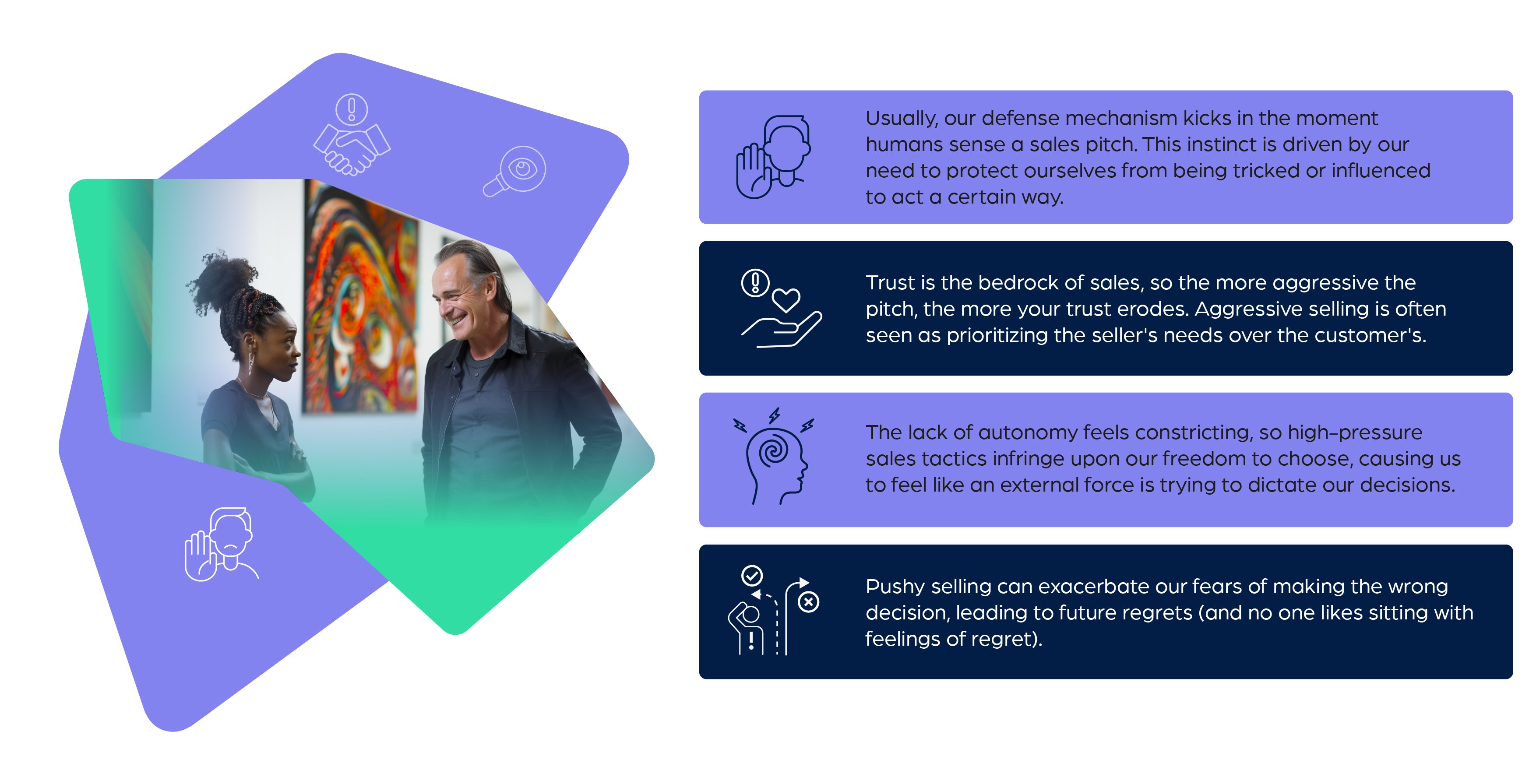
We’ve all been there: Stepping into a retail store, browsing the aisles, only to be immediately greeted by an enthusiastic sales associate. You're aware they might be on commission and are on the hunt to 'sell' (instead of genuinely wanting to help), so you instinctively pull away, murmuring “just browsing,” to deflect. That's human nature.
Now, translate that scenario to your business. If your sales calls have been falling flat lately, evoking that same guarded response, there's a good chance you're approaching them the wrong way. Perhaps you've been too eager to 'sell,' much like that store associate, rather than genuinely connecting.
To truly see your revenue scale, you'll need to recalibrate your sales strategy, anchoring it in understanding, trust, and genuine connection.
So why do we hate the idea of being 'sold to' so much?

Have you ever stopped to wonder why that gut reaction to "just browse" kicks in the moment a salesperson approaches?
It's not just a quirky trait shared by many; it's deeply rooted in our psychology. Humans, by nature, aren’t fans of feeling like someone’s sales target. Let's dive a bit deeper to unpack why we instinctively put our guard up when we sense that 'salesy' approach:
- Usually, our defense mechanism kicks in the moment humans sense a sales pitch. This instinct is driven by our need to protect ourselves from being tricked or influenced to act a certain way.
- Trust is the bedrock of sales, so the more aggressive the pitch, the more your trust erodes. Aggressive selling is often seen as prioritizing the seller's needs over the customer's.
- The lack of autonomy feels constricting, so high-pressure sales tactics infringe upon our freedom to choose, causing us to feel like an external force is trying to dictate our decisions.
- Pushy selling can exacerbate our fears of making the wrong decision, leading to future regrets (and no one likes sitting with feelings of regret).
Recognizing these innate psychological responses sets the stage for a revamped approach. It bridges us to the realization that traditional methods might not be the most effective.
Adopting a New Sales Mindset:
With the background of our human predispositions, let’s shift our perspective on how sales should be approached. Success doesn’t come from relentless pitching but from genuine understanding and connection.
You need to embrace a 'you'-centered mindset, starting with your next sales meeting. Dive into their issues, wants, and apprehensions. Let them be the conversation's star, while you offer support, showing them how your service fits into their narrative.
With this renewed mindset, the sales conversation transforms from a transactional interaction to a meaningful dialogue. This approach sets the stage for the actionable strategies to follow.
Four Cornerstones to Reshape Your Sales Calls:
Understanding the ‘why’ behind our sales resistance is one part of the puzzle; the ‘how’ is where the transformation truly happens.
Here are four pivotal strategies that will help you rejuvenate your next sales call.
- Make it about them, not you by shifting the limelight onto your prospect. Listen actively so you can understand their unique challenges and tailor your solution accordingly.
- Reassure with relevant case studies so you can build their confidence in you through relatable success stories of past clients, emphasizing their journey and eventual triumph.
- Facilitate risk evaluation by allowing your prospects to balance the risks against the rewards. Help them visualize their future with and without your services.
- Position yourself as an advisor and transition from a salesperson image to a guide. Emphasize how your services bridge their present to their envisioned future.
Implementing these strategies doesn’t just increase your sales chances but also strengthens your client relationships. And the stronger the client relationship, the higher their lifetime value becomes to your agency.
Time for less pitch and more profit
The sales game is shifting. It's no longer about pushing hard or using flashy gimmicks. It's about real conversations and genuine connections. With everything you've just read, you've got the tools to make those sales chats feel more like catching up with a friend. Think about it – if you engage like you truly get them, they'll naturally want to work with you.
It's about really being there for them, understanding them. So, next time you jump on a sales call, remember it's not about selling more, but making a better connection. And just watch how things change.
